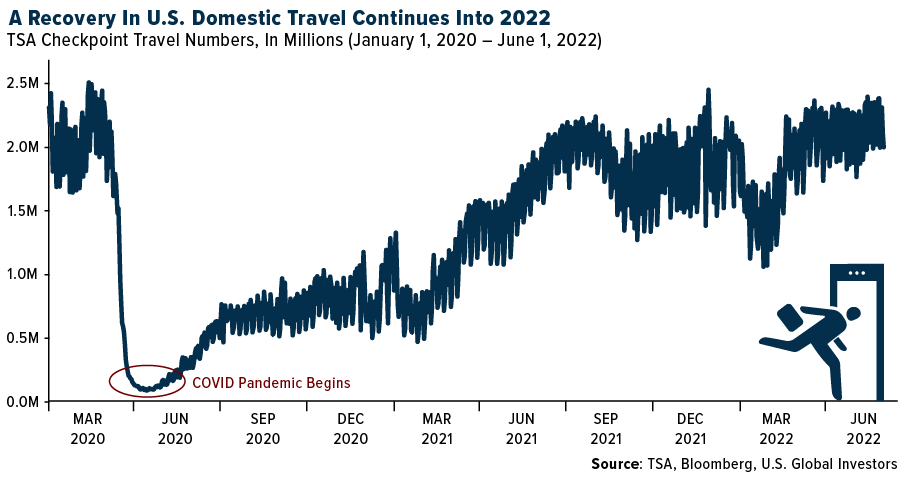The International Air Transport Association (IATA) recently released its Annual Review 2022, a report highlighting current trends in the airline industry that impact not only the airlines themselves, but direct consumers and government bodies as well.
Below we have summarized four key takeaways from the report, as relayed by IATA’s Director General Willie Walsh.
- Industry Resilience: Following the worst downturn in recent history, the aviation industry has proven resilient and is again on the rise. People are enjoying the freedom to travel, to connect with one another and to see the world. “By the end of 2023, most regions will be at – or exceeding – pre-pandemic levels of demand,” Walsh explains. Not only that, industry losses are forecast to reduce to $9.7 billion in 2022, down from $42.1 billion in 2021. This marks an enormous improvement from the $137.7 billion in losses witnessed in 2020. The chart below highlights how travel in the U.S. alone has recovered since the start of the pandemic, as measured by the number of passengers screened by the TSA.

- Pandemic Lessons: Walsh points out in the report that the importance of aviation was made absolutely clear by pandemic restrictions. “People recognized that their quality of life deteriorated and economies suffered,” he explains. By drawing the correct lessons from the COVID-19 pandemic, the IATA recognizes the importance of being better prepared, should there be a similar situation in the future. One of the biggest lessons learned, Walsh says, is that travel restrictions actually did little to contain the spread of COVID-19.
- Governments and Regulations: Many governments did well in recognizing aviation’s vital role in the global economy during the pandemic, the report explains, providing financial relief to many airlines. As governments now rebuild their regulatory agendas, Walsh says it is “critical that they continue to focus on regulations that create value.” The IATA promises to be vigilant and remind governments that the benefits of regulations must exceed the costs they create. “We see the temptation to introduce new consumer regulations, on everything from airline service offerings to accessible travel,” Walsh explains. “However, the focus of any new rules needs to be on addressing the operational issues in this area, rather than imposing penalties.”
- Sustainability: At its 77th Annual General Meeting, members of the IATA resolved to achieve net zero carbon emissions by the year 2050, the report reads. To achieve this, airlines must rely on infrastructure, supplier partners and the offset providers (those working to reduce emissions by investing in clean energy technologies) to do their part with credible initiatives that deliver real reductions. The game changer, says Walsh, is sustainable aviation fuel (SAF), which is expected to account for about 65% of our carbon mitigation efforts by 2050.
The full Annual Review 2022 report can be found by visiting the IATA website.
To learn more about airlines and gaining exposure to the industry, consider the U.S. Global Jets ETF (JETS) by clicking here.
All opinions expressed and data provided are subject to change without notice. Some of these opinions may not be appropriate to every investor.
Please carefully consider a fund’s investment objectives, risks, charges, and expenses. For this and other important information, obtain a statutory and summary prospectus for JETS here. Read it carefully before investing.
Investing involves risk, including the possible loss of principal. Shares of any ETF are bought and sold at market price (not NAV), may trade at a discount or premium to NAV and are not individually redeemed from the funds. Brokerage commissions will reduce returns. Because the funds concentrate their investments in specific industries, the funds may be subject to greater risks and fluctuations than a portfolio representing a broader range of industries. The funds are non-diversified, meaning they may concentrate more of their assets in a smaller number of issuers than diversified funds. The funds invest in foreign securities which involve greater volatility and political, economic and currency risks and differences in accounting methods. These risks are greater for investments in emerging markets. The funds may invest in the securities of smaller-capitalization companies, which may be more volatile than funds that invest in larger, more established companies.
The performance of the funds may diverge from that of the index. Because the funds may employ a representative sampling strategy and may also invest in securities that are not included in the index, the funds may experience tracking error to a greater extent than funds that seek to replicate an index.
The funds are not actively managed and may be affected by a general decline in market segments related to the index. Airline Companies may be adversely affected by a downturn in economic conditions that can result in decreased demand for air travel and may also be significantly affected by changes in fuel prices, labor relations and insurance costs.
Fund holdings and allocations are subject to change at any time. Click to view fund holdings for JETS.
Distributed by Quasar Distributors, LLC. U.S. Global Investors is the investment adviser to JETS.
